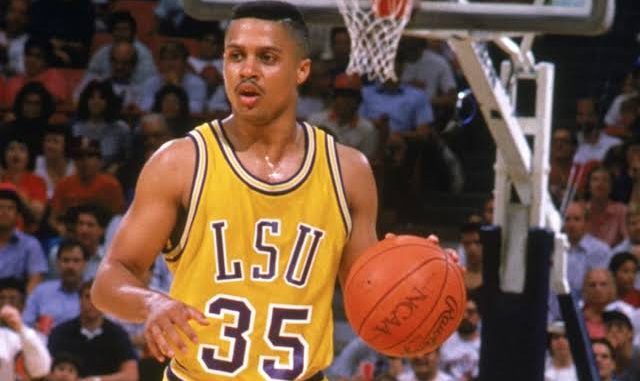BATON ROUGE, La. – The roar of the crowd, the swish of the net, and the unmistakable rhythm of a pure shooter – these are the indelible memories Mahmoud Abdul-Rauf carved into the very fabric of LSU basketball. Now, after decades away from the Pete Maravich Assembly Center in an official capacity, “The Shooter Is Back.” In a move that has ignited immense excitement among the LSU faithful, legendary guard Mahmoud Abdul-Rauf has officially returned to his alma mater, accepting the pivotal role of Director of Player Development for the men’s basketball program. This announcement is not merely a nostalgic gesture; it’s a strategic coup, bringing a wealth of experience, a unique perspective, and a storied career’s worth of wisdom to the next generation of Tigers.
For those who witnessed it, Abdul-Rauf’s two-year stint at LSU, then known as Chris Jackson, was nothing short of sensational. From 1988 to 1990, he electrified college basketball with his dazzling ball-handling, explosive scoring, and an almost mythical shooting touch. As a freshman in 1988-89, he set the NCAA freshman scoring record with an astounding 30.2 points per game, a mark that still stands today. He followed that up with 27.8 points per game in his sophomore year, earning consensus First-Team All-American honors in both seasons and being named SEC Player of the Year twice. His No. 35 jersey now hangs in the rafters of the PMAC, a testament to his undeniable impact on the program. He was, as many contemporary observers and even current coaches like to say, “Steph Curry before Steph Curry” – a revolutionary talent whose offensive prowess was ahead of his time.
His journey beyond LSU, while marked by incredible NBA achievements, also carried significant challenges and controversies. Drafted 3rd overall in the 1990 NBA Draft by the Denver Nuggets, he enjoyed a productive career, earning the NBA Most Improved Player award in 1993 and twice leading the league in free throw percentage, including the third-highest single-season mark in NBA history (95.6% in 1993-94). However, his conversion to Islam and his principled stance during the national anthem controversy in the mid-1990s led to significant media attention and, ultimately, a premature end to his prime NBA career. Yet, throughout it all, Abdul-Rauf maintained his dignity and unwavering commitment to his beliefs, earning respect far beyond the basketball court.
It is this rich tapestry of experience – the athletic brilliance, the personal growth, the overcoming of obstacles like Tourette syndrome, and the principled stand – that makes his return as Director of Player Development so profoundly impactful. He is not just a coach; he is a mentor, a living legend who understands the complexities of life as an elite athlete, both on and off the court.
The role of Director of Player Development has evolved significantly in modern college athletics. It’s no longer just about drills and shooting form, though Abdul-Rauf’s expertise in shooting is, of course, invaluable. It encompasses holistic player growth, including:
- Skill Refinement: Naturally, Abdul-Rauf’s legendary shooting prowess will be a focal point. Imagine young LSU guards learning the nuances of shot creation, off-ball movement, and pure shooting mechanics from one of the greatest to ever do it. His ability to explain, demonstrate, and instill confidence in a player’s shot is a rare asset.
- Mental Fortitude and Poise: Abdul-Rauf played under immense pressure at LSU and navigated significant scrutiny in the NBA. His personal journey, including managing Tourette syndrome, offers invaluable lessons in mental resilience, focus, and maintaining composure under duress. This is particularly crucial for young athletes facing the intense spotlight of SEC basketball.
- Professionalism and Work Ethic: Abdul-Rauf’s dedication to his craft was legendary. Stories abound of his relentless practice habits, including making hundreds of free throws in a row. He can instill this level of discipline and commitment, emphasizing that greatness is earned through relentless work behind the scenes.
- Life Skills and Personal Growth: Beyond basketball, Abdul-Rauf’s journey provides a profound narrative about identity, conviction, and standing up for what one believes in. He can guide players through the challenges of balancing athletics with personal values, navigating public scrutiny, and preparing for life beyond the game. In the age of NIL and social media, this mentorship is more critical than ever.
- Bridging Eras: His presence connects the current LSU program to its rich history. Young players will have direct access to a legend whose jersey hangs alongside Pistol Pete Maravich and Shaquille O’Neal. This connection can inspire a deeper appreciation for the program’s legacy and motivate players to uphold its high standards.
- Recruitment Appeal: Abdul-Rauf’s return is a significant boost to LSU’s recruiting efforts. Prospects, especially guards, will be enticed by the opportunity to learn from one of the all-time greats, known for his ability to score and lead. His story adds a powerful narrative that few other programs can offer.
This appointment signals LSU’s commitment to not only winning but also to developing well-rounded individuals who are prepared for the rigors of professional basketball and life beyond. It reflects a deeper understanding that player development extends beyond physical conditioning and tactical schemes. It’s about building character, instilling discipline, and nurturing the mental and emotional well-being of young athletes.
For the LSU community, Abdul-Rauf’s return is a homecoming of the highest order. He has maintained a connection with the university and the state over the years, and his jersey retirement in 2020 was a poignant moment of reconciliation and celebration. Now, he’s back in a tangible, impactful role, ready to impart the wisdom gleaned from a life lived fully and authentically. The presence of “The Shooter” on the sidelines, sharing his insights and guiding the next generation, will undoubtedly inspire players and excite fans, ushering in a new, hopeful chapter for LSU men’s basketball. His legacy as a player is secure; now, he has the chance to build a new one as a mentor and developer of talent, ensuring that the spirit of LSU basketball continues to shine brightly.



